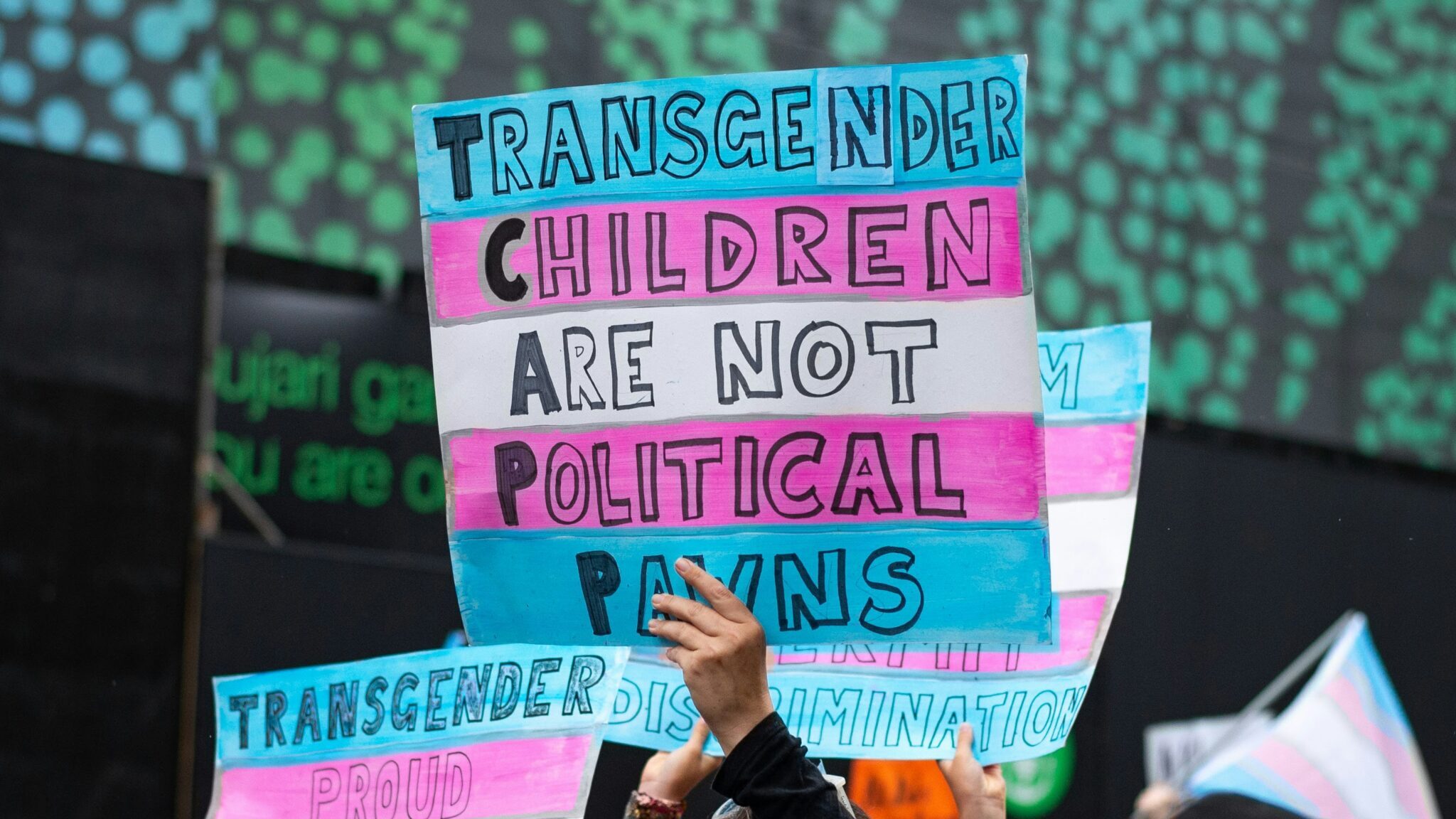Transgender actors and advocates for greater trans inclusion on Broadway gathered in the heart of Manhattan’s theater district on Monday. Called the Trans March on Broadway, the event was organized in response to producer Cameron Mackintosh’s recent statements that transgender casting in classic musicals is a “gimmick.” Participants seized upon the opportunity for transgender members of the industry to reclaim an ongoing debate about casting, inclusion and access.
“I’m not marching because of Cameron Mackintosh. I’m marching because there is trans erasure in this industry, and I want to have a conversation about trans people, led by trans people,” Sis, the actor, activist and founder of the Next Generation Project who organized the march told Variety in an interview before the event.
“When I look out, I see so many beautiful faces,” Peppermint, the “Rupaul’s Drag Race” star and transgender theater actress, said before the gathered crowd Monday afternoon, made up of a few hundred members of the New York theater community. “Of the trans faces I see, I see actors, performers, speakers, writers and creators. And I don’t see a single ‘gimmick.’ What I see are opportunities, and it’s time that they—they who are in the business of Broadway—know it.”
The event, which began in Central Park’s Sheep’s Meadow at noon and culminated in a march down Broadway to Schubert Alley — the geographic center of the Broadway universe. It drew roughly 200 people and featured speeches from transgender advocates and actors including Sis, Peppermint, Ianne Fields Stewart, Jayae Riley Jr., Qween Jean, and former “Jagged Little Pill” cast-members Iris and Nora Shell.
The march allowed an opportunity for several of the few transgender actors who’ve held roles on Broadway, despite a litany of contemporary shows like “Tootsie” and “Mrs. Doubtfire,” which advocates say profit from transgender stereotypes while casting cis gender performers, to share their experiences in the business.
Mackintosh, the powerhouse producer of “Les Misérables” and “The Phantom of the Opera,” subsequently tried to clarify his remarks, insisting that he was speaking specifically about re-casting the lead role in his musical version of “Mary Poppins” with a trans actress.
“Unfortunately, my answer has been misinterpreted to suggest that I am opposed to casting a transgender performer to play the role,” Mackintosh said in a statement. “This is absolutely not true. I meant only that I would not as a producer disregard the author P.L. Travers’ original intention for the character.”
“To be clear, whether a person is trans has no bearing on their suitability for any role in any of my shows, including Mary Poppins, as long as they can perform the role as written,” he added. “I am very sorry for any distress caused by my remarks being misrepresented. Trans actors are welcome to submit and audition for any of my productions.”
Peppermint, who in 2018 became the first Black trans woman to originate a principal role in an original Broadway cast with “Head Over Heels,” offered what she learned from her experience.
“I felt it was my responsibility to be the one person in the production who was the protector of anyone who was trans or gender nonconforming,” she told the crowd.
“When we were starting to rehearse ‘Head Over Heels,’ there was one person who identified as nonbinary and was sorting that out during the rehearsal process. They asked their supervisor to use their pronouns and their name, went through so much turmoil, and was eventually fired. I felt so horrible that I couldn’t protect this person,” she continued, suggesting that the crew members’ firing was due in part to their transition. “This Broadway show that was claiming cred in every newspaper also had other transgender and nonbinary people who were feeling unsafe.”
“I had to educate everyone else,” Peppermint said, speaking before the crowd, which included several Black trans women who carried sign that read ‘We want our stories told, too.’ “I thought I was there to do a job and get on stage and sing some songs—but I was holding seminars backstage,” she narrated. “I didn’t get paid for any of that work, but at the time, it was work that was necessary.”
In an interview before the event, Peppermint made it clear why she felt unsupported in her work as a transgender leader. She believes that putting too narrow a focus on Cameron Mackintosh’s recent statements is unproductive. “What Cameron Mackintosh said only reflected his practices,” she told Variety. “He was telling the truth about what he thinks. He was giving us a signal that this is where he—where himself and every other casting director and producer in the business who I’ve ever experienced—stand.”
Iris, who joined the original Broadway cast of “Jagged Little Pill,” Alanis Morissette’s 2019 jukebox musical bent on exploring modern issues of social justice, offered her experiences publicly for the first time.
“What happened to me was insidious and violent transphobia,” zie told her audience, gathered in a circle on the expansive Central Park lawn. “I’ve spent countless hours untangling the messaging in my head that I received from people in positions of power who claimed to support me and my community, and I’ve cried in rage about the fact that none of my cisgender cast members spoke out against the transphobia I was facing.”
Iris said zie learned of her position as the company’s only transgender actor when zie arrived for rehearsals, and zie soon began to question her safety at work. “I was bombarded with invasive questions about my experiences as a trans person from cast members and members of the creative and producing team. I understand now that my position was simple,” zie explained: “Offer up my trans experience as consumption as cis people in positions of power took from [my] lived experience, decided what to keep in their cis re-telling of [my] experiences, and chose to call it a trans narrative.”
Broadway, Sis told Variety, must continue to be the locus for new and innovative transgender stories and must strive to do so while uplifting the artists producers and creators choose to cast.
“If you get a show on Broadway, that show can be licensed,” Sis explained in an interview with Variety, just before the activist rallied her crowd and placed a group of open, Black transgender women directly in front of the theaters that have largely excluded them. “The minute a Black trans woman leads a new work or an original Broadway cast, that sets a precedent for everything that follows. Every time you cast that show, whether you’re in Minnesota or a high school in Texas or a South Korean tour, there must be a Black trans woman who tells that story.”
Casting a transgender actor in a Broadway role doesn’t have to be at odds with the demands of commercialization, Sis says.
“Disney is successful, Apple is successful, because they’ve found a way to innovate while making a commercially viable product,” Sis explained to Variety before the march. “We have to learn to take chances. All performers know that for something to be good, it must be special. You need a gimmick, if you will,” she continued, with a wink.
“If you want to tell a story, and you need something special, look at what’s working, what’s hot right now. Let’s put people in space on a Broadway stage,” she offered, only half joking. “Remember the movie ‘Gravity?’ What if we put the movie ‘Gravity’ on the stage, and the actress happened to be trans? The gimmick isn’t the trans person. The gimmick is seeing someone in space on a Broadway stage. Now, we have a story led by a trans woman—that humanizes and embraces her, and it’s innovative,” said Sis, arguably doing the work over which producers agonize.
“You can do two things at once, and they’re things that are of value to this industry,” she finished. “Tell a story and make money.”
The post appeared first on NBC.




